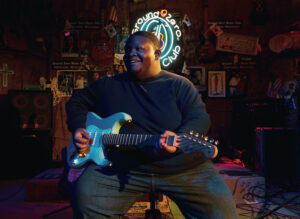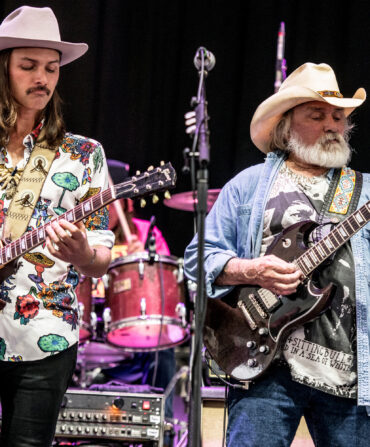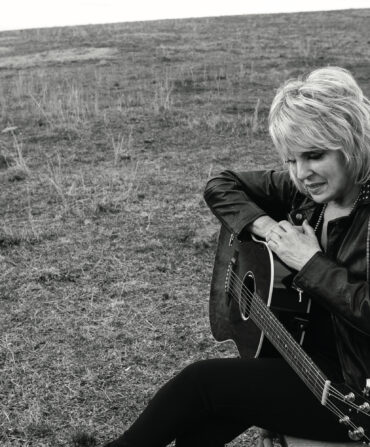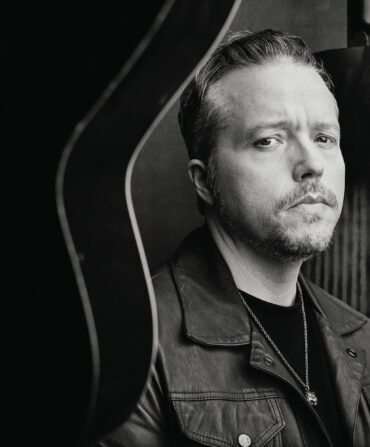Music
The New Guitar Greats
Eleven standout players keeping the south’s six-string traditions front and center
BLUEGRASS GROUNDBREAKER
Molly Tuttle

Photo: Ashli Linkous
Molly Tuttle performing at the Bristol Rhythm & Roots Reunion music festival.
The first woman to win Guitar Player of the Year from the International Bluegrass Music Association (in 2017 and 2018), Molly Tuttle continues to blaze a trail both leading her own band—she was nominated for two 2023 Grammys and won Best Bluegrass Album—and as an in-demand collaborator. It’s easy to see why. Tuttle has been playing bluegrass since she was eight and can more than hold her own with the likes of Sam Bush or Billy Strings with her virtuosic flat-picking, clawhammer, and cross-picking skills. But let’s face it: The guitar has too often been perceived as a man’s domain. Tuttle is having none of that. “As a female guitarist, I initially struggled to take risks on my instrument because I felt the need to prove myself and not make mistakes,” she says. “Over the years, I’ve become more improvisational and spontaneous.” —MH
ROCK STEADY
Sadler Vaden

Photo: Amy Harris/Invision/AP
Sadler Vaden on stage with Jason Isbell and the 400 Unit at Bourbon and Beyond Music Festival in Lexington, Kentucky.
History is filled with great guitar duos: Duane Allman and Dickey Betts. Keith Richards and Brian Jones (or Mick Taylor, or current partner Ronnie Wood). But it’s tough to come up with a modern-era double guitar attack as potent as Sadler Vaden and Jason Isbell. Vaden fell in love with rock guitar after his parents took him to see a 1996 Farm Aid show in Columbia, South Carolina, headlined by Neil Young and Crazy Horse. “It was so noisy, angry, and loud,” he recalls. “I was instantly hooked.” He began playing professionally at eighteen, when he realized he was better at playing guitar than “playing a high school student,” and after a stint with Southern legends Drivin N Cryin, he joined Isbell’s band, the 400 Unit, in 2013. The two have developed an almost innate chemistry, and Vaden is just as comfortable playing rhythm or lead, putting out three albums of his own that show off his versatility. “It’s about serving the song,” he says. “I play my part within a framework of another. But rhythm is always the driver of rock and roll, and it seems like a lost art today.” —MH
HONKY-TONK WARRIOR
Luke McQueary

Courtesy of Luke McQueary
On a dreary January evening in Nashville, the line to get into Robert’s Western World stretches more than twenty people deep. Robert’s is the last vestige of true honky-tonk music on neon-soaked Lower Broadway, and onstage is Luke McQueary, who is absolutely shredding his solo on Johnny Cash’s “Folsom Prison Blues.” The twenty-two-year-old guitarist and Kentucky native is a member of Kelley’s Heroes, a spin-off of the legendary Don Kelley Band, which ruled the Robert’s stage for more than twenty years and served as a vital incubator for rising musicians. Don Kelley himself retired in the early months of COVID, leaving McQueary, upright bassist Joe Fick, and drummer Billy Van Vleet to continue in his absence.
McQueary’s father turned him on to Kelley, and by the time he was seventeen, he was subbing in on Sunday nights before becoming a full-time player in 2020. “All I listened to as a kid was the Don Kelley Band,” he says in his thick drawl over a plate of barbecue before he hits the stage. The band plays essentially the same set of covers each night, but some are almost unrecognizable thanks to the members’ frenetic pace and monster solos. “We can make them sound so different than the originals,” McQueary says. “Just gotta jack up the energy.” With all of the hoots and hollers exploding from the crowd, mission accomplished. —Matt Hendrickson
THE GENRE BENDER
Samantha Fish

Photo: Amy Harris/Invision/AP
Samantha Fish takes to the mic at All In Music & Arts Festival in Indianapolis.
With each evolution of her sound, Kansas City–bred guitarist and singer-songwriter Samantha Fish has proved she’s always thinking of her next move. “You can stack my releases up back-to-back and hear this natural progression,” she says. Growing up in a city known for its jazz and jump-blues history—where the Count Basie Orchestra began electrifying audiences with its “hot” improvisation in 1935—Fish quickly made the connections between her rock-and-roll idols and the blues. Both traditions inform her approach, along with torch-singer soul and the locomotive rhythm and blues played in Mississippi’s Hill Country. “I’m just trying to create something that sounds timeless,” she says. “That’s always been my goal.” On Faster, her 2021 Rounder Records release, she worked with producer Martin Kierszenbaum (Lady Gaga) to create a set of spunky, pop-focused cuts, and her latest—Death Wish Blues, a collaboration with outlaw country figure Jesse Dayton—channels those same impulses through a fuzz box with the grit set to eleven. —Jim Beaugez
THE NEW NEWGRASS KING
Billy Strings

Photo: ROBBY KLEIN
Bluegrass phenom Billy Strings, photographed during a tour stop in West Virginia for G&G‘s October/November 2019 issue.
During a concert in the summer of 2019, Billy Strings divided a crowd as if he were Moses parting the sea. The progressive bluegrass fans were mesmerized with his maniacal picking. The traditionalists weren’t quite sure what to make of him, though one old-timer admitted “that kid can sure play.” That he can. And while he’s perfectly capable of whipping out some Bill Monroe tunes, fans know a song from Jimi Hendrix or the Grateful Dead might be next on the set list. In less than four years, Strings and his crack band have gone from playing clubs and small festivals to headlining arenas through sheer road doggedness and the breathtaking prowess of their instrumentation. “I love how he weaves together old-school bluegrass influences like Doc Watson with pedals, heavy-metal scales, and other more modern elements to make a sound that’s all his own,” says Strings’s friend Molly Tuttle. “I love how he stays so true to himself.” —MH
BLUES EXPLORER
Buffalo Nichols

Photo: Zoe Rain
Carl “Buffalo” Nichols at his studio in Milwaukee.
When Mississippi’s Fat Possum Records signed Carl “Buffalo” Nichols, the storied label behind the late-career resurgences of R. L. Burnside and Junior Kimbrough hadn’t taken on a new solo blues artist in nearly two decades. But that’s the enthusiasm the Texas-born, Milwaukee-raised Nichols brings to the table. He grew up listening to his parents’ Robert Cray and B. B. King records and started playing guitar at a young age, but it was a trip in his early twenties through West Africa and Europe, where he discovered Ukrainian and Carpathian folk styles, that helped inspire a renewed interest in American blues and folk traditions. “I wanted to reimagine what the blues would sound like if it hadn’t lost its cultural importance for so long,” he says. “It just became less interesting and less progressive, and there’s less risk taken by the artists, and I feel like that’s the part that’s missing.” His self-titled 2021 debut explores his homeland’s country-blues idiom without treating it like a relic or curiosity, but rather as a vital document of life in twenty-first-century America. —JB
THE NATURAL
Marcus King

Photo: Alysse Gafkjen
South Carolina native Marcus King.
Marcus King’s first memory, from sometime in the late nineties, is of discovering his dad’s Epiphone El Dorado acoustic guitar while he was away at work. “He must’ve had it tuned to open, because when I strummed it, it made some form of a chord,” he recalls, “and I’ve been chasing that high ever since.” Widely acknowledged as one of today’s most skilled and versatile guitarists, King, who grew up in Greenville, South Carolina, was playing Carolina bars by his early teens, and at seventeen he hit the road with his eight-piece Marcus King Band. He’s been touring almost nonstop since, in between putting out three albums of soul-rooted Southern jam rock with his band, plus two more on his own with Dan Auerbach of the Black Keys producing. His latest, 2022’s boogie-rocker El Dorado, takes its title from the guitar and the Cadillac model of the same name, both of which now reside at his Nashville home. “My parents brought me a housewarming gift, and it was that guitar,” he says. “I had the El Dorado out front, and I had moved to Nashville, which was my City of Gold. It was really full-circle stuff.” —JB
STRING SISTERS
Larkin Poe

Photo: Eric Ryan Anderson
Larkin Poe sisters Rebecca (left) and Megan Lovell, with her signature slide guitar, photographed outside of Nashville.
Guitar-playing sisters Rebecca and Megan Lovell, better known as the blues-rock duo Larkin Poe, come from a classically trained musical background, playing violin and piano from sheet music. So when they first attended the annual bluegrass jam MerleFest in North Carolina when they were twelve and thirteen, respectively, a new realm of possibilities unfolded. “We were blown away by the improvisation that was happening onstage, and the idea of songwriting and coming up with your own stuff on the spot was very novel to us,” Megan says. When Rebecca was fifteen, she became the youngest person to win a mandolin contest at the festival, but now she’s usually seen playing a traditional six-string alongside Megan, who dons her signature slide guitar. When they’re not self-producing their own records, like their 2022 set Blood Harmony—which doesn’t leave much downtime these days—they enjoy the challenge of backing other artists, including Elvis Costello, Steven Tyler, and the late Tom Petty. “We love placing ourselves in creative situations where you have no idea what’s gonna happen,” Rebecca says. “You’re requiring yourself to be spontaneous and to dig deep and find something new.” —JB
COUNTRY ROCKER
John Osborne

Photo: ALYSSE GAFKJEN
John Osborne, of Brothers Osborne, at his Pine Box studio in Nashville.
At his East Nashville studio, John Osborne has just finished playing two new songs from the upcoming Brothers Osborne album when he gets word that Jeff Beck has died at seventy-eight. Beck was a guitarist’s guitarist, never reaching the commercial heights of his peers like Eric Clapton and Jimmy Page, but an extraordinary talent who could make his instrument sound like it was talking to you. That resonates with Osborne. “I was a shy, nerdy kid growing up, and the guitar gave me a voice to speak with,” he says. “It still allows me to get out some complex things in my subconscious that I’m not able to do verbally.”
Over the course of the band’s three albums, Osborne has established himself as one of Nashville’s premier players, likened to the second coming of Duane Allman or Lynyrd Skynyrd’s Allen Collins. In fact, some Brothers Osborne fans have tabbed the band’s hit “Stay a Little Longer,” with its multiple sections, as a modern-day, country “Free Bird.” Osborne says he wrote the guitar part as a kind of homage to influences such as the Eagles, the Allman Brothers, and even U2. Ironically, it’s John’s brother and the band’s lead singer, TJ Osborne, who often comes up with the hooks on hits such as “Shoot Me Straight” and “Rum.” “TJ’s a great guitarist, but it’s not his first instrument,” Osborne says. “He comes at it from a very primal, visceral place. I appreciate that. A guitar player like me always wants to make things more complicated.” —MH
DELTA STAR
Christone “Kingfish” Ingram

Photo: Justin Hardiman
Christone “Kingfish” Ingram playing at Ground Zero Blues Club in Clarksdale, Mississippi.
Clarksdale, Mississippi, blues guitarist and singer-songwriter Christone “Kingfish” Ingram first captured attention as a teenage blues prodigy. Now when the twenty-four-year-old channels the grace of B. B. King and the fire of Jimi Hendrix, it’s clear he’s grown into his crown as the new King of the Delta Blues. On his latest album, the Grammy-winning 662, named for the Mississippi area code, Ingram addresses the joy and pain of living in the Delta, as on the slow-burning “Another Life Goes By,” which confronts listeners with the region’s lingering social ills and features a verse from fellow Mississippian Big K.R.I.T. on a recent remix. Musically, he draws inspiration from both the Delta greats and contemporary R&B and guitar influences like Prince and Eric Gales. This year, Ingram will get to repay his mentor, Buddy Guy, who paid for his first album, by opening select dates on the blues legend’s final tour. “It’s a beautiful thing just to be end to end with him,” Ingram says, “and to reflect on everything that he’s done for me in the past.” —JB
See the South’s Hottest Guitar Heroes
>> Jason Isbell Picks a Legacy







